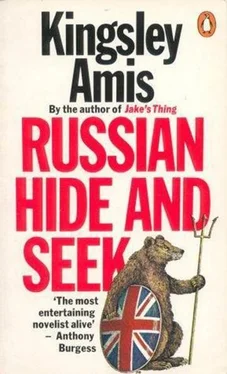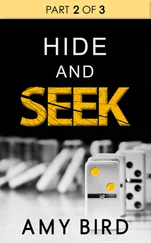Kingsley Amis - Russian Hide-and-Seek
Здесь есть возможность читать онлайн «Kingsley Amis - Russian Hide-and-Seek» весь текст электронной книги совершенно бесплатно (целиком полную версию без сокращений). В некоторых случаях можно слушать аудио, скачать через торрент в формате fb2 и присутствует краткое содержание. Жанр: Современная проза, на английском языке. Описание произведения, (предисловие) а так же отзывы посетителей доступны на портале библиотеки ЛибКат.
- Название:Russian Hide-and-Seek
- Автор:
- Жанр:
- Год:неизвестен
- ISBN:нет данных
- Рейтинг книги:3 / 5. Голосов: 1
-
Избранное:Добавить в избранное
- Отзывы:
-
Ваша оценка:
- 60
- 1
- 2
- 3
- 4
- 5
Russian Hide-and-Seek: краткое содержание, описание и аннотация
Предлагаем к чтению аннотацию, описание, краткое содержание или предисловие (зависит от того, что написал сам автор книги «Russian Hide-and-Seek»). Если вы не нашли необходимую информацию о книге — напишите в комментариях, мы постараемся отыскать её.
A handsome and highly sexed young Russian cavalry officer, Alexander Petrovsky, joins the plot and learns to his regret that politics and playmates don't mix.
"Funny, cynical, captivating-Amis makes an implausible situation almost believable, then lets his characters worry their way out." (B-O-T Editorial Review Board)
Russian Hide-and-Seek — читать онлайн бесплатно полную книгу (весь текст) целиком
Ниже представлен текст книги, разбитый по страницам. Система сохранения места последней прочитанной страницы, позволяет с удобством читать онлайн бесплатно книгу «Russian Hide-and-Seek», без необходимости каждый раз заново искать на чём Вы остановились. Поставьте закладку, и сможете в любой момент перейти на страницу, на которой закончили чтение.
Интервал:
Закладка:
His comb struck a tangle of hair at the crown of his head, spun out of his hand and skidded across the top of the dressing-table to vanish between it and the wall. Cursing loudly in English, he used excessive force to make an aperture for his arm. His groping fingers soon found the comb, but they had already found something else as well, something that felt like a crumpled piece of card. It proved to be a treasure he had thought for a year or two to be lost – he had had no cause to look behind the dressing-table in that time, and no more had any servant: the ancient photograph, taken seven metres below where he stood, that had told him of the cypress avenue, the yew hedge, the statues of nymphs and hunters, the little stone lions once to be seen from his window. Whether because of the lapse of time, or the renewed effect of the old flat-look process, or most likely the experience he had gained in the interval, the sight affected him strongly.
In a few seconds his manner lost all its new firmness and sobriety and his eyes grew unfixed. He imagined, or tried to imagine, the scene in the photograph not as it was, not empty, not strange and sad, but enlivened by some of the people who had known it just as it was then, at the very moment the camera had recorded it, the men in tweed suits, striped shirts and the ties of their school, university or regiment, the women wearing elaborate dresses of light coloured silk and fine silk stockings, with much jewellery. At this hour, perhaps, they would have been eating gherkin sandwiches and drinking gin, Scotch whisky, port, champagne, out of crystal goblets.
What had they thought was awaiting them? -for Alexander had always fancied, had taken it for granted, that the picture commemorated a vanished world not by chance but by design, that it dated from the last months or days of that world and had been pushed under the gallery floor for him to find, or more strictly for him to take possession of some years after a workman replacing rotten boards had found it. What had they said to one another, those men and women of the final stage of capitalism? Had they talked of the starving pensioners in their tiny unheated rooms, of the dying children turned away from hospitals because their parents could not afford to rent a bed for them, of the immigrants cowering at the backs of their shops while the racist mobs looted and burned and the police stood by or joined in the rapine, of the groups of workers hastily assembling and training for the supreme struggle? (Hardly of the last-mentioned, which could be assumed to have taken place in secret, though details of this and of all the other matters were lacking.) Or had that conversation of long ago revolved round traditional interests, fox-hunting, pheasant-shooting, cricket, the London theatre, adultery? He had no idea whatever of the answers to any of these questions, just hoped very much that some sort of Yes could be attached to the last one because that made the participants more admirable, more aristocratic, more English. And surely that other Alexander would have enjoyed his hold on the life he had always known until the instant when it was forcibly taken from him.
At the thought of his namesake and predecessor, Alexander Petrovsky raised his head and lost some of his dreamy look. After a pause he stepped across to the bookcase, took out the purple-bound volume, opened it at an acute angle and popped his finger inside. Then he read aloud, in a high, slow, monotonous voice, the passage that either chance or a prodigiously close knowledge of the lay-out had put in his way.
‘Freckled hands reach out to clasp in love,
The mouth drools that would kiss, the straining eyes
Hold sweet images of what never was;
Ah, shut them with a blow, strike aside
The hands, silence the mouth for ever
Before it calls for reason, faith, justice,
And the hangmen come.
This time the reader shut the book without a sound and replaced it gently on the shelf. After standing a minute in thought, evidently unpleasing thought, he gave a long sigh, checked his appearance in the wardrobe mirror and marched out, straightening his mess-jacket.
Downstairs, in the drawing-room, in the east hall, by the east front, the first guests were assembling. Three long tables formed an open square on the paved space between the entrance staircases and the edge of the pond. There were dishes of ham, smoked goose, cold mutton, cold chicken, cold sliced beetroot, marrow, red cabbage, watercress and endive, bowls of date chutney and pickled mushrooms and onions, and plates of thick white bread and butter. Peaches, gooseberries, loganberries and cream and junket were also offered, together with several varieties of cake. Bowls of a transparent plastic meant to resemble glass contained a cold punch of Krasnodar Riesling with lemon-juice and sugar-syrup and a slight stiffening of vodka. Vodka itself was to be had for the asking, and of course there would be plenty of asking.
These informal receptions of the Controller’s, held on the second and fourth Friday of every month from March to October, were highly valued throughout the units of supervision, not for the generous hospitality alone, though this was indeed a factor, nor so much for ordinary social reasons as for the opportunity, provided almost nowhere else, of running into colleagues, opposite numbers, persons normally inaccessible for reasons of rank or protocol and, in these unceremonious circumstances, settling in a couple of minutes difficulties that weeks of official exchanges might have failed to solve.
The difficulty which now occupied the Controller and his wife had been doing so on and off for nearly ten years and was certainly not going to be settled in a couple of minutes. Even so, the urgency in Tatiana Petrovsky’s tone and manner suggested that she had by no means given up hope of one day carrying her point. She and her husband were standing some distance round the curve of the pond, away from the sprinkling of guests; it was years since, in furtherance of informality, Petrovsky had left off the practice of having individuals presented on arrival at the fortnightly receptions.
‘You must speak to him,’ she said, not being a believer in originality for its own sake.
‘I can hardly speak to him this minute, my love.’
‘That’s precisely what you can do, Sergei. He’s just arrived, he’s on his own, he’ll be sober and above all he’ll be unprepared. That’s your only chance of getting him to listen to you. If you signal your intention by telling him you want to have a chat with him, or… however you put it, by the time you see him he’ll have worked out which attitude to use to keep you at a distance, cold or humble or… You know how he is.’
‘Yes, I think I do. What do you want me to say?’
‘Dear God, what I’ve just been telling you, that she’s a notoriously disreputable creature, also that one of her young men committed suicide and she was suspected of murdering another, or at least accidentally killing him, but she was never charged, nobody was, that she-’
‘All allegation. Rumour.’
‘What else would you expect? One’s friends and their friends aren’t on oath, but why should they lie, and tell the same lie? That woman is a pervert. She likes… Well, Agatha Tabidze wouldn’t specify, and we’ve been friends for ten years. Surely that suggests something.’
‘Indeed it does, like everything else you say about her-that the lady must be irresistible to any young man of spirit. Oh, I don’t welcome it, of course, but…’
‘But what?’
Sergei Petrovsky’s handsome bearded face showed a refined discomfort, an awareness of duty left undone coupled with mild, regretful cynicism about the real value of that duty. His attire was similarly diversified: austerely-cut suit of dark-grey flannel or an approximation to it, bright-coloured striped waistcoat with copper buttons in student style and cream shirt with open collar, bureaucratic necktie thrown aside. Beside him, round-shouldered and not tall, in finely-woven azure cotton with lilac ribbons, Tatiana was to the casual eye a much less impressive figure. A second glance might have noted determination in her gaze and in the set of her mouth, and strong will or at least obstinacy in the prominent bar of frontal bone above her eyes, a characteristic inherited by her sons but not her daughter, and one who had noted so much might very likely have gone on to feel a certain sympathy for a man whose wife knew so precisely and so certainly how he ought to behave on any occasion and was so fully prepared to make him a present of that knowledge at any time. Only a close and attentive friend of the family, perhaps, Agatha Tabidze or another, was in a position to observe how unimpressively, how lamely Sergei answered Tatiana’s scoldings and urgings and how serenely he did or went on doing just as he pleased, which in practice usually meant not doing something that would incur hostility.
Читать дальшеИнтервал:
Закладка:
Похожие книги на «Russian Hide-and-Seek»
Представляем Вашему вниманию похожие книги на «Russian Hide-and-Seek» списком для выбора. Мы отобрали схожую по названию и смыслу литературу в надежде предоставить читателям больше вариантов отыскать новые, интересные, ещё непрочитанные произведения.
Обсуждение, отзывы о книге «Russian Hide-and-Seek» и просто собственные мнения читателей. Оставьте ваши комментарии, напишите, что Вы думаете о произведении, его смысле или главных героях. Укажите что конкретно понравилось, а что нет, и почему Вы так считаете.












